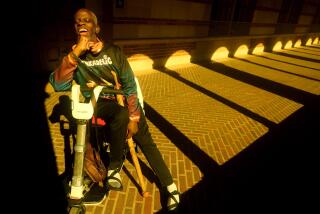Women’s Studies Becomes Degree Program
- Share via
When Cal State Fullerton senior Laura Barrios graduates next year, she will have a bachelor’s degree in women’s studies, a subject that until last month was a lower-level program.
After 16 years as an area for minor emphasis only, women’s studies debuted in February as a full-fledged major in the university’s College of Humanities and Social Sciences.
“This is a really vibrant program with a lot of potential,” said Renae M. Bredin, an assistant professor of women’s studies and the program’s first full-time faculty member.
“Women’s studies covers the gamut that impacts women’s lives. Women’s issues are everybody’s issues. Not just for the women, but for the men who occupy their lives. From women at work to reproduction rights, these topics are closer to women’s lives than any other topics.”
Bredin reports that nearly a third to half of her students are males.
There are 11 students now enrolled in the bachelor’s program, five of whom expect to take their bachelor’s of arts diplomas in women’s studies at the end of this semester.
Roughly 100 students attend classes offered by the program.
“There’s a list of students waiting in the pipeline to look and declare either a minor or major,” said Bredin, who came to Fullerton in the fall of 1998 from a college in New Jersey.
*
In California, 15 schools offer either a bachelor’s or master’s program in women’s studies. According to the National Women’s Studies Assn., there are more than 500 programs in the country.
Barrios said her interest in women’s studies began after taking an ethics class.
“Going through school my whole life, I didn’t know much about women’s history or working women,” the 21-year-old from Placentia said.
“At school, we learned to memorize the names of presidents, but we didn’t learn about the social aspects of women shaping society. The past is always his story, but now I can refer to her story.”
When Barrios wanted to focus on women’s studies, it was not a degree-granting program, so she declared herself a major in American studies, with a minor in women’s studies. The change in the program’s status means she can qualify for degrees in both disciplines.
Barrios knows women’s studies seems odd or politically correct to some.
“People fear the word ‘feminist,’ ” she said. “People think you’re a neo-Nazi feminist, that you hate men and you’re a lesbian, and you want to overthrow society in a completely radical way. It’s not like that. We just want equality, justice and basic rights for everybody.”
Before she transferred to Fullerton from Cal Poly Pomona, she was studying hotel and restaurant management. Now she has other plans.
“I want to go into law, perhaps as an advocate of women’s life and rights,” Barrios said. “This major gives me a good analytical and research background to understand society. It allows me to see things in a different light, and I’m more aware of things that are sexist, racist or gender-biased.”
The program, which has been offered as a minor since 1984, now allows students to major in women’s studies and have an emphasis in other fields.
“The difference between the two is basically they have to take more classes,” said Sandra Sutphen, coordinator of women’s studies and professor of political science. Students need to take 38 units for a major and 23 units for a minor.
Since the program is an interdisciplinary degree, students are required to take core courses, then add classes in other subjects.
“It’s been a well-established phenomenon in higher education that students [with such interdisciplinary studies] have a more holistic and rounded education,” Sutphen said.
“This program draws upon the different majors from art and humanities studies. This makes for a well-rounded student who can go into the business field, education and social work as well as administration,” Sutphen said.
*
Thomas P. Klammer, acting dean of the College of Humanities and Social Sciences, pointed out that nearly 60% of the campus’ students are female. He called the women’s studies program a “wonderful addition” to the college.
Melissa Chiprin, 36, of Costa Mesa said she chose women’s studies for her major because she wanted some questions answered.
“I’ve been a feminist for a long time, and I’ve been aware of the issues of inequality,” Chiprin said. In the program, she found a place where she could learn about and discuss women’s issues without being threatened.
“In women’s studies, it addresses all that,” Chiprin said. “It empowers you to learn that women are doing a lot of other things such as in government and law.”
More to Read
Sign up for Essential California
The most important California stories and recommendations in your inbox every morning.
You may occasionally receive promotional content from the Los Angeles Times.













